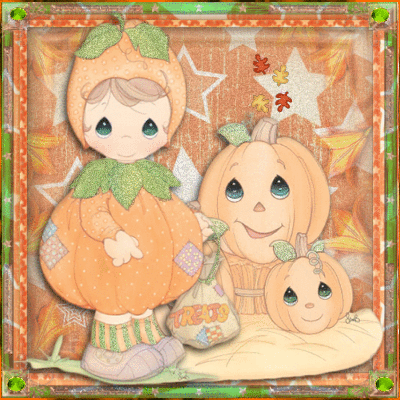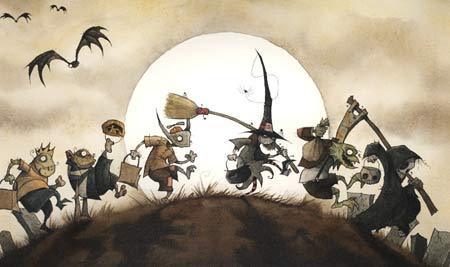Costumed in Confusion
It's time to defend Halloween again. It's coming up very soon as I write, but it will be just past when you read this. The other day, Carol and I noticed two Halloween-related items. First, the local newspaper carried a story about–get this—a Halloween egg hunt. Huh? I've heard of combining Christmas and Hanukah into "Christmukah," which makes little sense to me, mainly because it would appear to obscure the meanings of both holidays that have been crammed into the blender. Well, here we go again! Easter eggs for Halloween? Is the goal to assimilate Halloween, mistakenly imagined as a pagan holiday, to Easter? I could see it, I guess, if the point was to assimilate the resurrection to a zombie or vampire story, but I doubt anyone has thought it through to that extent.
I had noticed a day or so earlier how some school or church was advertising a "Harvest Festival." True, this is a farming community, so such a celebration would be entirely appropriate. But I cannot help suspecting that "harvest festival" is just a sanitized, emasculated substitute for Halloween, just like the Secular Humanist attempts to celebrate Christmas while denying they are doing it by renaming it "Solstice" or "Humanlight." Ho ho ho.
There is a particular irony in shrinking away from Halloween in superstitious fear and retreating to a Harvest Festival or Fall Festival, because such a celebration of seasonal passage is essentially pagan, a vestige of nature worship. By contrast, Halloween (which means "Eve of All Saints Day") is a Christian holiday, mocking the powers of Evil in light of the victory of Christ. But if that's too theological for you (and I admit, it is for me these days), how about this? Halloween is an occasion to laugh at our fears (especially fear of death), which is to defy death and thus to triumph over it in the only way poor mortals can.
And that leads me to the second thing Carol and I noticed. We were watching a new episode of The Office, and the theme was a Halloween party, organized by the office staff. The new CEO, Robert California, a bit of a Zen master, complains that the costumes and decorations, the general mood, are just not scary enough. He takes one look at the "costume" sported by new manager Andy Bernard, who is dressed as a utility worker of some kind, complete with flannel shirt, jeans, and a flashlight helmet. The boss says to him, "So on this night of wild fantasy, you've dressed as a laborer." Is Andy signaling that work is a horror to him?
Kevin, Darryl, and Jim are wearing Hockey (or some sport) jerseys. Angela is a cat, Pam a rabbit. Kelly, Toby, and Gabe are wearing cutesy skeleton costumes. Stanley is a chef. Only Dwight is really up for it, decked out as a monster queen from a video game. Creed is garbed as Osama bin Laden. Erin is made up as the hamburger mascot Wendy. Robert California (not costumed) goes around unobtrusively asking most of them what they personally fear the most. At the end of the evening, he tells the gang an impromptu scare story he has woven together from their individual fears. They seem more sobered than entertained. But the boss sees that this is the whole point: facing your fears. Not fleeing them. Not pretending there is nothing to fear (perhaps in the vain hope that religion can protect you from them). But facing them as fears, even if our Halloween celebration is to some extent whistling in the dark. What's wrong with that? At least it's not self-deception.
Tillich somewhere says that the more Nonbeing that Being can take into itself, the stronger it will be. The fantasy evils and monsters of Halloween serve to incarnate the Nonbeing of our fears. By embracing them in a spirit of shivery fun, we take the Nonbeing into our own being and become stronger for it. I think that, without that jargon, the basic lesson is conveyed even to children, or at least it would be if we still really celebrated Halloween.
The demise of Trick or Treat attests this cultural failure of nerve. Back in the early 1970s baseless urban legends of candies containing razor blades frightened foolish parents into keeping their little darlings home and off the streets. Didn't they realize they were implicitly casting the pall of suspicion on their neighbors, whom they signaled they believed might be molesters and child-murderers? So kids went instead to Halloween parties in private homes, churches, or schools. That would not have been a fatal blow (major though it was). The real damage to the holiday was the trend toward sickeningly innocuous costumes. Rainbow Bright? Clowns? Bums? Sponge Bob? Princesses? Dogs?
What the hell?
This is Halloween, for Boris's sake, not some "come as a weakling" costume party! Where are the Werewolf, Frankenstein, witch, mummy, vampire, and devil suits? They have succumbed to the real horrors: the friggin' Care Bears and Barney the Simpering Dinosaur (no wonder they went extinct!). "Harvest Festivals" denote a shallow sense of life, a self-deceiving pretense that there is nothing to fear, so that courage never even comes up as a virtue.
People seem to think that fear is the thing to fear. But it is not. What is courage after all, but the determination to act, to do one's duty, despite one's fears? To act without fear is mere rashness, foolhardiness. I think of a 1990S Justice League comic written by Grant Morrison. In it, Daniel the Sand Man, a master of dreams and the subconscious, reassures Kyle Raynor, the new Green Lantern, as he is about to go into battle, unsure of his abilities to fill the shoes of his illustrious predecessor Hal Jordan. The Sandman says, "You will surpass him. You already know what he could never learn." Kyle asks, "What's that?" The answer: "Fear."
So says Zarathustra.
Robert M. Price's Blog
- Robert M. Price's profile
- 237 followers





